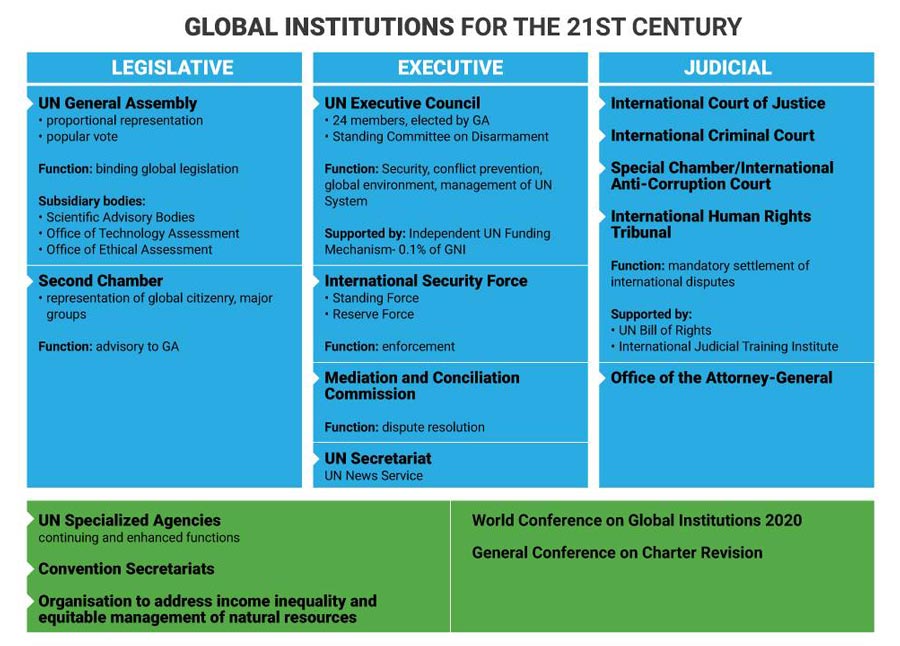Imagining the evolution of the United Nations presents a tantalizing proposition: Can this storied institution adapt to the exigencies of the 21st century, or are we witnessing the twilight of its influence? This question, though seemingly playful, unveils a complex challenge that beckons global governance specialists to re-envision the UN’s role in an ever-shifting geopolitical landscape.
The global community stands at a crossroad where the multiplication of transnational issues—such as climate change, humanitarian crises, and burgeoning inequality—imposes an urgent need for efficacious governance frameworks. The UN, established in the aftermath of World War II, was designed as a platform for dialogue among nations. However, its capacity to navigate contemporary challenges is increasingly scrutinized. To address this, an eclectic amalgamation of scholars, practitioners, and thought leaders is collating insights to imagine a revitalized version of the UN that can better attune to the aspirations of diverse populations.
At the heart of this deliberation lies the Bahá’í teachings, which advocate for the oneness of humanity and the necessity of collective governance. They pose a compelling theoretical pillar upon which the future of global governance may be constructed. According to the Bahá’í perspective, the UN can transform from a predominantly intergovernmental organization into a more integrated and participatory entity that encompasses a wider array of voices, including those marginalized in political discourse.
The first element to consider is inclusivity. The Bahá’í teachings promote the idea that true governance cannot occur without the representation of all voices. Global governance specialists must explore ways to enhance the participation of underrepresented populations, such as women, youth, and indigenous groups, in decision-making processes. This could involve reimagining processes within the UN General Assembly or expanding the consultative role of civil society organizations. By doing so, the UN can shift from a top-down approach, where decisions are made by a select few, to a model that embraces a more democratized ethos, reflecting the myriad perspectives that populate the global tapestry.
Next, we must consider the significance of innovation within the structure of the UN. The rapid evolution of technology offers unprecedented opportunities for connecting people and facilitating dialogue across borders. Utilizing artificial intelligence and big data, the UN could enhance its capacity to respond to global challenges more swiftly and effectively. For example, integrating data-driven analysis into the UN’s operational strategies could streamline humanitarian response efforts, providing a more nuanced understanding of regional crises, thus allowing for targeted interventions that are both timely and impactful.
Furthermore, there exists a critical need to elevate the role of education in this imagined evolution. An educated populace is foundational to a thriving democracy. Central to the Bahá’í teachings is the belief in universal education as a prerequisite for progress. The UN must foster global educational initiatives that expand access to knowledge, challenge dogmas, and cultivate a global consciousness. By embedding education within its developmental programs, the UN can mitigate ignorance and prejudice that often fuel conflicts. International collaborations could lead to frameworks that track educational metrics, thus rendering transparency and accountability.
Another salient point in the evolution of the UN is the adaptation of peacekeeping and conflict transformation strategies. Historically, peacekeeping missions have focused on mitigating immediate threats; however, there is a burgeoning recognition that sustainable peace necessitates addressing the underlying socio-economic disparities and grievances that ignite conflict. Drawing from the Bahá’í principles advocating for justice and equity, global governance specialists must seek to reorient peacekeeping initiatives toward inclusive governance models that engage local communities in peacebuilding efforts. This would entail training local leaders, fostering dialogue among conflicting parties, and integrating social development into peace efforts.
Additionally, as we ponder the future of the UN, the pressing challenge of climate change looms ominously. The Bahá’í teachings underscore the interconnectedness of humanity, a sentiment echoed in the need to address environmental degradation collaboratively. This existential threat is representative of a global challenge that transcends borders. Hence, the UN must leverage its status as a convening authority to strengthen international partnerships that promote environmental sustainability. This involves not only setting ambitious climate targets but also ensuring that all nations have equitable access to the resources necessary to meet these goals.
A further inquiry into the UN’s evolution necessitates an exploration of its institutional adaptability. Can an organization, established on particular principles, demonstrate the nimbleness required to confront the unforeseen? The Bahá’í teachings advocate for the dynamic nature of truth and the necessity for continuous reassessment of governance structures. Specialists in global governance must therefore devise mechanisms for periodic evaluations that account for societal shifts and emerging challenges. This may include incorporating feedback loops that allow for the assessment of initiatives and adjustments based on their efficacy and public reception.
In conclusion, the journey toward reimagining the United Nations as a beacon of global governance in the 21st century is fraught with challenges yet rich with opportunities. The Bahá’í teachings offer a profound philosophical underpinning that emphasizes collective dialogue, inclusivity, education, and justice. As governance specialists collaborate to forge pathways for a more resilient UN, they not only address pressing global challenges but also strive towards the realization of a world where peace and unity are not mere aspirations, but tangible realities. The evolution of the UN may not rest solely on its structure, but rather, on the collective commitment of humanity to weave together the strands of diversity into a cohesive global community.
